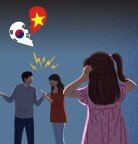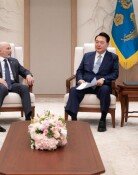[Opinion] Korean Corporate Culture
Andrea Sachs, a recent Ivy-league graduate, tries to realize her dream of becoming a journalist in a best selling book, The Devil Wears Prada. In the novel, the narrator Sachs is hired as a junior personal assistant to Miranda Priestly, the all-powerful editor of a fashion magazine. Sachs is shocked to find out that Emily, a senior personal assistant, holds her water for hours just because she is afraid of missing a call from Miranda. Those who have worked in the U.S. claim that the labor intensity is unimaginable tense, although it is not as tough as illustrated in the book.
Though the lunchtime of Americans is about an hour (the law requires a thirty minute break and the employers provide the rest), most of them make do with sandwiches and coffee. Thats why take out culture is well developed in the U.S. Meanwhile, American employees leave the office on time because people are tend to presume staying late at the company is due to incompetence.
A bar, a noraebang (singing room), and again to a bar and so on. We kept on drinking and changed venues five times until 4:00 a.m. But surprisingly, they all came to the office early in the morning and they worked as usual. This is an article written by a foreign university student who finished the Global Internship Program at the SK Group.
Although it might have been written in admiration of Korean employees discipline and corporate culture where employees show up in the office punctually regardless of what happened last night, those who have experience in pretending to be early at work but actually goofing off on the job taking for a long break at a sauna, may laugh with bitterness.
Even though Korean workers work more hours compared to those in advanced nations, the number of hours at work does not correspond with efficiency or productivity because there isnt a clear line between work and private affairs. Koreans go out smoking together with a number of co-workers during working hours and even does not drink coffee alone but all in a group laughing and gossiping.
While Japanese workers does a group exercise and prepare tools before working hours, Koreans seem to assume things like the exercise and preparation of tools should be done during office hours. I think the intern was saying ironically to criticize Koreas work culture where employees work as if at play, and play as if at work.
Chung Seong-hee, Editorial Writer, shchung@donga.com







